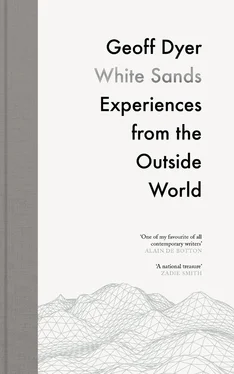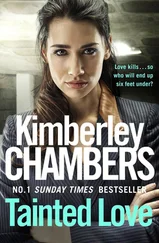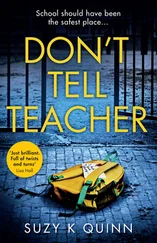White Sands
My wife and I were driving south on Highway 54, from Alamogordo to El Paso. We’d spent the afternoon in White Sands and my brain was still scorched from the glare. I worried that I might even have done some permanent damage to my eyes. The sand is made of gypsum — whatever that is — and is as bright as new-fallen snow. Brighter, actually. It’s really quite unbelievable that anything can be so bright. It’s a very good name, White Sands, even though we thought the place a bit disappointing at first. The sand was a little discoloured, not quite white. Then, as we drove further, the sand started to creep onto the road and it became whiter, and soon everything was white, even the road, and then there was no road, just this bright whiteness. We parked the car and walked into it, into the whiteness. It was hard to believe that such a place really existed. The sky was pristine blue, but the thing that must be emphasised is the whiteness of the sand, which could not have been any whiter. We would have liked to stay longer in this unstained wilderness, but we had to get to El Paso that night. We walked back to the car and headed out of the park.
Jessica was driving. It was early evening. We were about sixty miles south of Alamogordo and the light was fading. A freight train was running parallel to the road, also heading south.
‘Hitchhiker!’ I said, pointing. ‘Shall we pick him up?’
‘Shall we?’ Jessica was slowing down. We could see him more clearly now, a black guy, in his late twenties, clean and not looking like a maniac or someone who smelled bad. We slowed to a crawl and took a good look at him. He looked fine. I lowered my window, the passenger window. He had a nice smile.
‘Where ya going?’ he said.
‘El Paso,’ I said.
‘That’d be great for me.’
‘Sure. Get in.’
He opened the door and climbed into the back seat. Our eyes met in the mirror. Jessica said, ‘Hi.’
‘’Preciate it,’ he said.
‘You’re welcome.’ Jessica accelerated and soon we were back up to seventy and drawing level once again with the long freight to our left.
‘Where’ve you come from?’ I asked, twisting round in my seat. I could see now that he was perhaps older than I had initially thought. He had deep lines in his face, but his eyes were kind and his smile was still nice.
‘Albuquerque,’ he said. I was slightly surprised. The logical way to have got to El Paso from Albuquerque would have been to go straight down I-25. ‘Where you from?’ he asked.
‘London,’ I said. ‘England.’
‘The Kingdom,’ he said.
‘Right.’ I was facing straight ahead again, because I worried that twisting around in my seat would give me a cricked neck, to which I am prone.
‘I thought so,’ he said. ‘I love your accent.’
‘What about you?’
‘Arkansas originally.’
‘That’s where my mother’s from,’ said Jessica. ‘El Dorado, Arkansas. Before she moved to England.’
‘I’m from Little Rock,’ he said.
‘Like Pharoah Sanders,’ I said. It was a pointless thing to say, but I have this need to show off, to show that I know things; in this instance to show that I knew about jazz, about black jazz musicians. The guy, evidently, was not a jazz fan. He nodded but said nothing, and we prepared to settle into the occasionally interrupted silence that tends to work best in these situations. We had established where we were from and where we were going, and a pleasant atmosphere filled the car. Then, less than a minute later, this pleasant atmosphere was changed absolutely by a sign:
NOTICE
DO NOT PICK UP HITCHHIKERS
DETENTION FACILITIES IN AREA
I had seen the sign. Jessica had seen the sign. Our hitchhiker had seen the sign. We had all seen the sign, and the sign had changed our relationship totally. What struck me was the plural: not a detention facility but detention facilit ies . Several of them. The notice — and I took some heart from the fact that the sign described itself as a Notice rather than a Warning — did not specify how many, but there were, clearly, more than one. I did not glance at Jessica. She did not glance at me. There was no need, because at some level everyone was glancing at everyone else. As well as not glancing, no one said a word. I have always believed in the notion of the vibe: good vibes, bad vibes. After we saw the sign the vibe in the car — which had been a good vibe — changed completely and became a very bad vibe. This was a physical fact. Somehow the actual molecules in the car underwent a chemical change. The car was not the same place it had been a minute earlier. And the sky had grown darker— that was another factor.
We soon came to the facilities which had unmistakably been designed with detention in mind. Both places — there were two of them, one on the right and one on the left — were set back from the road, surrounded by high walls of razor wire, and brightly lit by arc lights. There were no windows. In the intensity and single-mindedness of their desire to contain menace they exuded it. At the same time, both places had something of the quality of IKEA outlets. I wished they were IKEA outlets. It would have been so nice if our hitchhiker had said that he had come to buy a sofa or some kitchen units and that his car had broken down. We could have sympathised with that. As it was, no one said anything. No one said anything, but I know what I was thinking: I was thinking that I had never been in a position where I so wished I could wind back the clock just one or two minutes. I would have loved to wind back the clock, to say to Jessica, ‘Shall we pick him up?’ and heard her reply, ‘No, let’s not,’ and sped past, leaving him where he was. But you cannot wind the clock back in this life, not even by two seconds. Everything that has happened stays happened. Everything has consequences. As a consequence, we couldn’t have not picked him up, but I could have asked him to get out. I could have said, ‘Look, man, I’m sorry, but in the circumstances would you mind getting the fuck out of our car?’ I could have done this but I didn’t, for several reasons. First, I was worried that if I did suggest he get out he might go berserk, might kill us. Second, I was worried that by asking — by telling him, really — to get out I would be being rude. So instead of asking him to get out we drove on in tense silence. The car sped along. There seemed no point slowing down. In any situation there is always something positive to emphasise. In this one it was the fact that there were no traffic hold-ups at all. Jessica was gripping the wheel. No one was speaking. The silence was unendurable but impossible to break. Unsure what to do, I turned on the radio. We were still tuned to a classic rock station that we had been listening to earlier in the day, before we got to White Sands, and as soon as the radio came on, in the fading light of New Mexico, I recognized the piano tinkle and swish of ‘Riders on the Storm.’ I am a big fan of the Doors but I did not want to hear this song now. It was unbelievable. A few moments later we heard Jim Morrison crooning:
There’s a killer on the road
His brain is squirming like a toad. .
Having turned on the radio with such disastrously appropriate results it seemed impossible, now, to turn it off. The three of us sat there, listening:
If you give this man a ride, sweet family will die. .
Jessica followed the advice offered by Jim Morrison elsewhere in his oeuvre. She was keeping her eyes on the road and her hands upon the wheel. I kept my eyes on the road and my hands in my lap. Day was still turning to night. The lights of oncoming cars were dazzling and did not augur well. The song continued. Ray Manzarek was doing his little jazzy solo on the electric piano or whatever it was. We are in a totally nightmarish situation, I thought to myself. The rain on the record made it seem like it was raining here as well, under the clear skies of New Mexico, south of Alamogordo, heading towards El Paso. Before I could pursue this thought the guy in the back seat cleared his throat. In the tense atmosphere of the car the sound was like the blast of a gun going off.
Читать дальше












